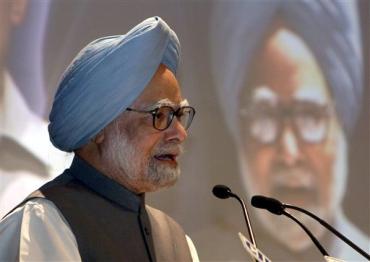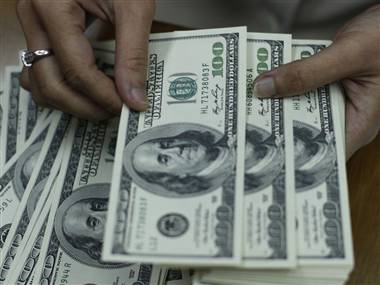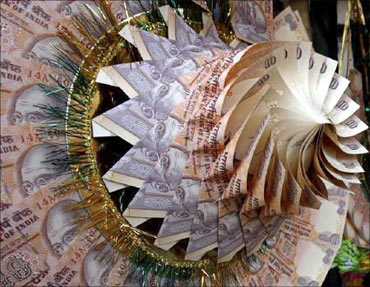A K Bhattacharya
Does the UPA govt have any other options if it wants to exploit its public sector assets to raise resources and bridge its fiscal deficit?
The Union government appears to have got into a panic about its disinvestment programme.
Against a Budget target of raising Rs 40,000 crore (Rs 400 billion) through sale of its equity in public sector enterprises during the current financial year, it has achieved a paltry Rs 1,145 crore (Rs 11.45 billion) so far.
Only five months are left and the stock market conditions do not look too good.
The government, therefore, may have some justification for examining a host of alternative options to improve its performance on the disinvestment front.
Last year also, the government had failed to reach its disinvestment target.
. . .
Is govt an enlightened shareholder?
It had hoped to raise Rs 40,000 crore through sale of equity in public sector enterprises, but ended the year with only Rs 22,763 crore (Rs 227.63 billion).
Remember that the stock market was in better shape then and in spite of that the government could achieve only 57 per cent of its disinvestment target.
In the current year, the shortfall in the target could be much higher.
One of the options under consideration to boost disinvestment proceeds is cross-purchase of shares by public sector enterprises.
In other words, the government would sell its stake in a few state-controlled companies, already listed on stock exchanges, to other public sector enterprises.
. . .
Is govt an enlightened shareholder?
The central exchequer would raise resources in the process, but some public sector enterprises would have to use up their funds to buy shares in some other government-controlled companies.
This is a desperate move by a government falling short of its revenues.
The Atal Bihari Vajpayee government also indulged in similar cross-purchase of shares by three oil companies in the public sector in 1998-99, but no other government has repeated this ploy since then.
That is perhaps because after those cross-purchases the Vajpayee government moved to the fast lane by going for several strategic sales of equity in public sector undertakings.
. . .
Is govt an enlightened shareholder?
This meant privatisation and the process went on till the United Progressive Alliance government brought it to a halt in 2004.
No privatisation, but only sale of equity in public sector enterprises, it said. Even this process slowed down because of opposition from Left parties, which then used to support UPA.
In 2009, UPA in its second tenure, with no Left-imposed curbs, went ahead with disinvestment in a big way.
However, the stock markets turned volatile, upsetting the government's revenue-raising plans through disinvestment.
The question now is whether the UPA government has any other options if it wants to exploit its public sector assets to raise resources and bridge its fiscal deficit.
. . .
Is govt an enlightened shareholder?
It is important for the government here to recognise what the disinvestment policy, pursued by different governments in the last 20 years, has achieved so far.
The department of disinvestment maintains a list of 50 central public sector enterprises, which are traded on the national stock exchanges.
These enterprises have a combined market capitalisation of over Rs 13 lakh crore (Rs 13 trillion), a little more than a fifth of the total market capitalisation of all companies listed on Indian stock exchanges.
Mind you, the list of 50 enterprises does not include public sector banks, some of which are listed on the bourses.
That's not all.
. . .
Is govt an enlightened shareholder?
Four out of the top 10 companies ranked by their market capitalisation belong to the public sector stable.
These are ONGC, Coal India, NTPC and State Bank of India.
These companies and BHEL also figure in the 30-scrip Sensex, the benchmark index for the Bombay Stock Exchange, accounting for a weight of over 12 per cent.
The point to be noted here is that the government's disinvestment policy over the last two decades has actually helped bring out the value for its shareholders and there is today a greater recognition of the important role they play in India Inc.
You might argue that they operate in areas where there is little competition from the private sector and their success can largely be attributed to the protection they continue to enjoy.
. . .
Is govt an enlightened shareholder?
Image: Indian Parliament.Photographs: Reuters
That argument, however, is not entirely valid any more.
State Bank of India is holding its own in spite of the stiff competition it faces from a clutch of private sector banks.
BHEL faces intense competition in the domestic market and still manages to come out with a performance that its competitors are envious of.
ONGC remains profitable, though its achievements since liberalisation of the 1990s have not been notable.
Coal India is the only one in this list that faces negligible competition from the private sector.
So what are the lessons for the government from the way its disinvestment policy has worked?
. . .
Is govt an enlightened shareholder?
One, it should acknowledge that its disinvestment policy, though flawed in many ways, has worked to some extent by at least producing a list of 50 public sector enterprises whose market value is significant.
Two, it must identify those units in this list that need special financial support from the government so that they can do even better against rising competition.
Instead of allowing cross-purchase of shares among public sector enterprises, which can only reduce their market valuations, the government should understand the market principle and act as an enlightened shareholder.










article